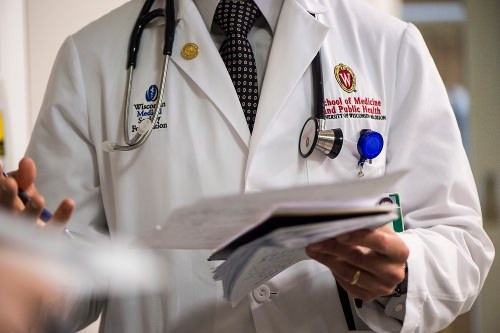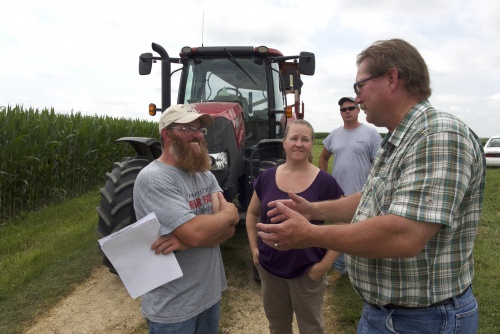UW showcases statewide and local impact in latest reports

From its campus on the shore of Lake Mendota, the University of Wisconsin–Madison boosts the state of Wisconsin’s economy, health care and quality of life with its research, teaching and outreach. Photo: Bryce Richter
When it comes to helping Wisconsin residents and the state’s economy, you Can’t Stop a Badger. See how UW–Madison offers service to the state, and builds long-lasting community connections. Follow along using #CantStopABadger on social media. Your support can help us continue this work.
A newly released series of reports from the University of Wisconsin–Madison showcases how the university connects with each of Wisconsin’s 72 counties.
Based on the latest available data, these reports outline county and statewide enrollment trends, alumni counts, community partnerships, projects and financial connections.
The Wisconsin Idea Database project, found at go.wisc.edu/counties, aims to detail the ways UW–Madison benefits the state through career preparation, economic development, innovative partnerships and workforce development. It is part of a broader campus commitment to improving the lives of all Wisconsinites through world-class academics, research and service.
The effort builds on a 2021 economic impact report showing that UW–Madison, UW-affiliated organizations and UW-related startups contribute $30.8 billion per year to the Wisconsin economy, supporting 232,000 jobs and generating $1 billion in local and state taxes.
“Since its creation 175 years ago, UW–Madison has positively impacted every corner of Wisconsin,” says Charles Hoslet, vice chancellor for university relations. “From the beginning, UW–Madison has been a vital contributor to the state’s industry and economy and has helped raise people’s standard of living. It’s also provided an affordable, world-class education to hundreds of thousands of students, many of whom have stayed in — or returned to — the state and continue to give back.”
Highlights from the reports include:
Access to higher education

Students follow along with the lecture on their laptop computers in Chemistry 103 in Agricultural Hall. Photo: Althea Dotzour
As of fall 2022, there are about 17,000 undergraduates from Wisconsin currently enrolled at UW–Madison. In 2022-23 academic year, the university awarded about $69 million in financial aid to Wisconsin resident undergraduates.
Nearly 20 percent of all state undergrads — or 3,283 Wisconsin students — receive aid covering the full amount of tuition and fees through either Bucky’s Tuition Promise or the Badger Promise. UW–Madison is augmenting those programs with the recently announced Bucky’s Pell Pathway, which covers the full financial need for Pell-eligible students, including tuition, housing, food and other expenses.
The School of Education also supports future Wisconsin teachers through the Wisconsin Teacher Pledge, which has placed more than 200 teachers in state classrooms and was recently extended through 2026-27.
All told, more than 177,000 UW–Madison alumni currently live in Wisconsin, in every county in the state. About 48,000 of them graduated within the last ten years.
According to the most recent First Destination Survey, 71% of undergraduates who graduated in the 2020-21 academic year received job offers before commencement. 100 percent of survey respondents had participated in internships, co-op experiences, employment or volunteer work during their time at UW–Madison. And 85 percent agreed that their education at UW–Madison prepared them for the next step in their career path.
Training the state’s future healthcare professionals

An embroidered W crest is pictured on a medical student’s white coat during floor rounds at UW Hospital and Clinics. Photo: Jeff Miller
UW–Madison partners with more than 500 healthcare facilities around the state to provide critical on-the-job training to UW–Madison medical, nursing and pharmacy students. This total includes statewide and regional healthcare systems and retail pharmacies, non-profit and public sector institutions of all sizes, small hometown businesses and clinics and everything in between.
Many graduates stay in state and continue to provide high-quality care. More than 18,000 alumni of UW–Madison’s School of Medicine and Public Health, School of Nursing and School of Pharmacy currently live in Wisconsin — in every one of the 72 counties.
Building Wisconsin’s economy

Students got a chance to meet employers and discuss jobs at a student job fair. Photo by Taylor Wolfram
Between July 2021 and June 2022, UW–Madison paid more than $292 million to 2,800 Wisconsin businesses, individuals and organizations through the formal purchasing process for goods and services. These transactions include everything from major ongoing vendor relationships to one-time purchases.
Employers from across Wisconsin seek out professional development opportunities at UW–Madison. During the 2021-22 fiscal year, employees at more than 750 Wisconsin businesses and organizations benefited from course offerings from Interdisciplinary Professional Programs (InterPro), the UW–Madison College of Engineering’s advanced training center. In that same period, 265 businesses sent employees to the Center for Professional and Executive Development in the Wisconsin School of Business.
UW–Madison remains central to advancing Wisconsin’s world-class dairy and cheese-making reputation. Of the more than 100 cheese manufacturers in Wisconsin, 40 of them employ Master Cheesemakers as certified by the Center for Dairy Research.
Hundreds of collaborations

Matt and Beth Mueller, who farms east of Lancaster, discuss cover crops with Gene Schriefer (right), the Iowa County UW Extension agriculture agent, at a field day at Lancaster Research Station in 2017. David Tenenbaum
The project also details the hundreds of collaborations between UW–Madison and Wisconsin communities. For example, the UW Division of Extension has supported local leaders and volunteers all over the state for more than a century in areas that include agriculture, health and well-being, families and finances and natural resources.
Another example is the unique UniverCity Year program, in which UW–Madison students and faculty partner with Wisconsin counties and local governments to help solve their real-world problems. In 2023, the program launched a record-breaking nine new cohorts; since 2015, UCY has worked with 29 Wisconsin communities.
Find many more examples of the links between UW–Madison and the state at https://wisconsinidea.wisc.edu/ and https://impact.wisc.edu/.
Subscribe to Wisconsin Ideas
Want more stories of the Wisconsin Idea in action? Sign-up for our monthly e-newsletter highlighting how Badgers are taking their education and research beyond the boundaries of the classroom to improve lives.
Tags: outreach, The Wisconsin Idea




